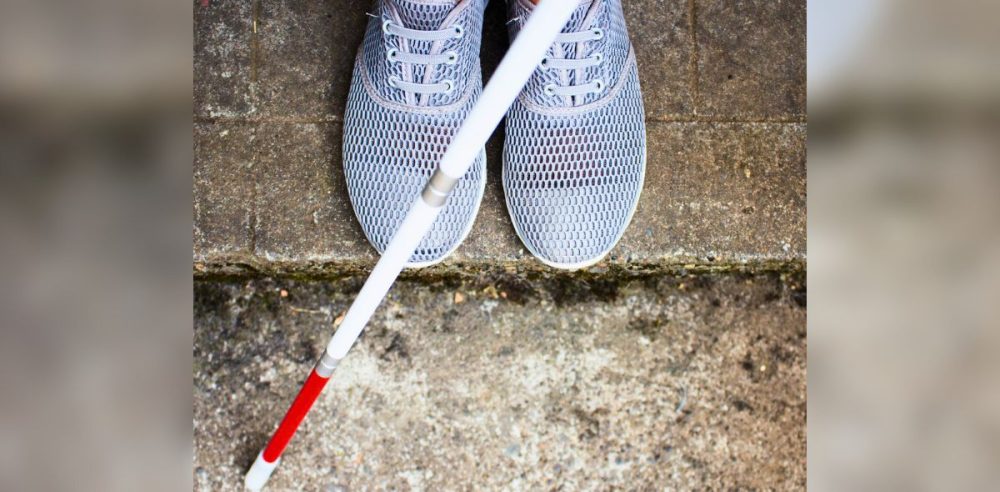February is Low Vision Awareness Month, but what exactly are we raising awareness about?
I seldom address this subject because it’s quite personal, and let’s face it: unless you or someone dear to you is affected, most simply don’t care or haven’t the energy to spend thinking about anything more. This truth is reality and comes with no judgment from me.
What is also a reality is that everyone is affected by something, so why should I expect another to be concerned about what impacts me?
The short answer is that I don’t expect anything.
The long answer is that I hope that by sharing, we each see one another as suffering from the human condition, which happens to be terminal. As such, maybe in our flawed bodies and tired minds, we can build one another up for the time we are given—what a beautiful irony that many miss: vulnerabilities often become man’s strongest bridge that connects me to you — you to me.
As such, perhaps sharing will inspire you to open up to another… whatever the subject.
I welcome your feedback, stories, and inspiration.
***
I have a white cane that I use at night. Years ago, she and I became acquainted. Initially, I hated her. I called her my skinny white b**ch. I know, not very Christian of me. Her nickname I kept to myself, and over time, I have shaken my head at how much anger I once carried for her.
In truth, my anger wasn’t toward her; it was toward myself. And once I filtered it, I realized it wasn’t anger but grief and fear.
In my defense, the cane was ridged, cold, and indifferent to my good and bad days. My cane didn’t care about my mood, the temperature, the traffic, or uneven sidewalks. She didn’t prevent me from tripping, but she did help me put one foot in front of the other.
And isn’t that what we expect of ourselves regardless of the circumstance? Get up. Keep going, even if you stumble.
In this, I learned the art of perseverance.
I eventually traded my white cane for a custom yellow one. This kept me focused on walking on the sunny side of life, no matter how much darkness surrounded me.
It doesn’t escape me that God’s first creation was light, as darkness was already present.
“Now the earth was formless and empty, darkness was over the surface of the deep, and the Spirit of God was hovering over the waters. And God said, ‘Let there be light,’ and there was light” (Genesis 1:2-3).
God did not dispel darkness but added light. This is a reminder that darkness is real, but so is light. I must praise God for introducing light. The Light of the World is not only real but eternal.
“When Jesus spoke again to the people, he said, ‘I am the light of the world. Whoever follows me will never walk in darkness, but will have the light of life’” (John 8:12).
No matter my circumstances, as a child of God, I do not walk in darkness.
In this, I learned the art of flaming faith into action.
As with you, my brother and sister in Christ, darkness may surround us, but it will not take root within us. The fire of the Holy Spirit within us is a far greater power source than any darkness.
Over the years, the yellow cane and I have become companions: a forced marriage of necessity that has bloomed into familiarity and, in some way, affinity.
People look at me strangely when they see me walking unassisted during the day and even driving short distances, only to watch me at night, unable to drive and using a cane.
Partial vision loss can be confusing. Try being a teen who was afraid to sleep out of fear of waking and having their vision be one degree less.
In all categories of grief, every degree of loss is significant.
It is hard to explain a hereditary, degenerative eye disease that affects peripheral and night vision. Some days are better than others. Eye fatigue, stress, cloud coverage, dim lights, etc., all play a role.
For years, I fought sleep as my field of vision worsened. I wanted my eyes to remain open to take in everything for as long as the gift of sight would allow.
As I aged, I surrendered to the importance of the blink itself, rest, and literal shut-eye.
I reconciled day and night and the significance of each.
In this, I learned the art of balance.
I am still learning the art of acceptance without minimizing my purpose. I would venture to say that many of us are lifelong learners in this department.
What is most important is not our adaptation to this world but our response and responsibility as followers of Christ while we are in this world.
As such, low vision can impact us all. Many people have too low of a vision of God and an inflated vision of themselves.
We can illuminate His goodness and grace by doing our best to live within God’s will daily. In this pursuit, we can strive to be bearers of love, joy, peace, forbearance, kindness, goodness, faithfulness, gentleness, and self-control.
In this, we collectively learn the art of community, elevating our vision to look out for one another, be kind to one another, and come alongside one another—in essence, to love as Christ loves us.
This column was initially published by CherryRoad Media. ©Tiffany Kaye Chartier.


